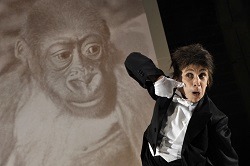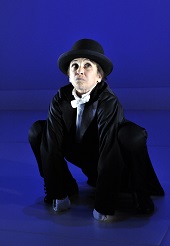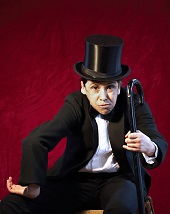Kafka’s Monkey at HOME in Manchester
 As silence falls in the small auditorium at the HOME Theatre, a hunched figure knuckles its way onto the stage and arrives at the podium. It scratches its bowler-hat topped head, puffs out its cheeks, and rolls its eyes. Just as the audience is gaping in wonder at this human actor’s perfect mimicry of an ape, the figure takes a hip-flask out of its jacket pocket, takes a swig, and addresses the watchers. ‘Esteemed ladies and gentlemen of the Academy!‘ Now, the audience wonders at this ape’s ability to portray a human.
As silence falls in the small auditorium at the HOME Theatre, a hunched figure knuckles its way onto the stage and arrives at the podium. It scratches its bowler-hat topped head, puffs out its cheeks, and rolls its eyes. Just as the audience is gaping in wonder at this human actor’s perfect mimicry of an ape, the figure takes a hip-flask out of its jacket pocket, takes a swig, and addresses the watchers. ‘Esteemed ladies and gentlemen of the Academy!‘ Now, the audience wonders at this ape’s ability to portray a human.
 Olivier-award winner Kathryn Hunter‘s incredible portrayal of an ape trying to assimilate into humanity is particularly powerful for this very reason – the audience forgets that they are watching a woman play an ape trying desperately to be a man, and feel as though they really are watching an ape give a speech to the Academy, detailing his transformation from wild animal to tamed variety show performer. The periodical audience involvement, skilfully incorporated into the adaptation of Kafka’s “A Report to an Academy” by Colin Teevan, contributes to this feeling, as does the small size of the auditorium, which allows almost every seat to feel close to the stage. The performance is also fleshed out with added quips, which change depending on the location. At HOME, we were treated to a gentle dig at the Palace Theatre, giving the play an even greater feeling of familiarity with the audience.
Olivier-award winner Kathryn Hunter‘s incredible portrayal of an ape trying to assimilate into humanity is particularly powerful for this very reason – the audience forgets that they are watching a woman play an ape trying desperately to be a man, and feel as though they really are watching an ape give a speech to the Academy, detailing his transformation from wild animal to tamed variety show performer. The periodical audience involvement, skilfully incorporated into the adaptation of Kafka’s “A Report to an Academy” by Colin Teevan, contributes to this feeling, as does the small size of the auditorium, which allows almost every seat to feel close to the stage. The performance is also fleshed out with added quips, which change depending on the location. At HOME, we were treated to a gentle dig at the Palace Theatre, giving the play an even greater feeling of familiarity with the audience.
 The set is minimalistic, emphasising Kathryn Hunter’s physically complex performance, from carrying out the whole delivery hunched and contorted, to climbing around above the stage, to sliding effortlessly into the splits. The vocal aspect of her acting is also noteworthy, as she slips from humanspeak to apespeak, and back again, always conveying the image of being trapped between two world, and not quite inhabiting either one.
The set is minimalistic, emphasising Kathryn Hunter’s physically complex performance, from carrying out the whole delivery hunched and contorted, to climbing around above the stage, to sliding effortlessly into the splits. The vocal aspect of her acting is also noteworthy, as she slips from humanspeak to apespeak, and back again, always conveying the image of being trapped between two world, and not quite inhabiting either one.
Both acting and staging come together to bring alive a script that is quintessential Kafka, a grotesque satire of humanity, a probing of forced assimilation, and a questioning of the value of freedom, in a way that makes you laugh as you watch, but cry when you remember.







